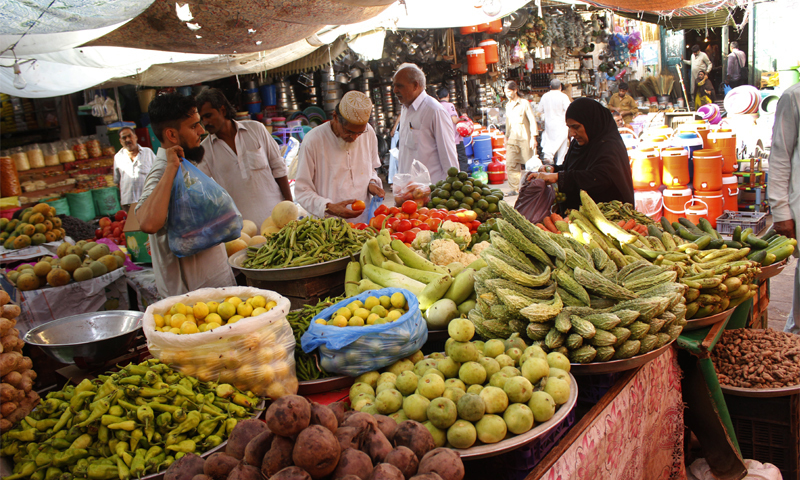ISLAMABAD: Consumer prices influenced by faster rupee depreciation and rising energy prices last month increased to their highest level in three months, the Pakistan Bureau of Statistics (PBS) data showed on Friday.
Inflation measured by Consumer Price Index surged to nine per cent in September from 8.4pc in August, the period when global oil prices kept on rising steadily, undermining earlier gains. The global oil prices reached $80 a barrel against $40 in January this year.
Over the past three months, prices of fresh vegetables, fruits and meat have also posted a persistent increase in major urban centres. The average inflation during the July-September period rose to 8.58pc on a yearly basis. Inflation had started declining after surging to 11.1pc in April, mainly driven by a drop in prices of agriculture products.
In 2020-21, annual CPI inflation was recorded at 8.90pc against 10.74pc the preceding year. For the last two years, the subdued production of sugar and wheat had been contributing to an increase in food inflation. On the other hand, petroleum products have witnessed an unprecedented increase in their prices, causing a rise in non-food inflation.
Food inflation is still at a higher level as in urban areas it jumped by 10.8pc in September on a yearly basis and 3.6pc on a monthly basis, whereas the respective price level growth in rural areas stood at 9.1pc and 3.7pc.
The PBS data showed that in urban areas food items, which saw an increase in their prices in September as compared to the previous month, included chicken 42.04pc, onions 32.49pc, pulse masoor 15.70pc, eggs 14.43pc, wheat flour 9.69pc, wheat 7.31pc, gram whole 5.98pc, mustard oil 4.56pc, pulse gram 4.33pc, vegetables 3.95pc, pulse mash 3.81pc, cooking oil 3.64pc, beans 3.35pc, vegetable ghee 3.20pc, sugar 3.04pc, tea 2.78pc, besan 2.37pc and meat 2.20pc.
In urban areas, the prices of tomatoes declined by 18.90pc, pulse moong 4.02pc and potatoes by 2.62pc. In rural areas, similar increases in prices of essential food items were also recorded.
Finance Minister Shaukat Tarin on Friday linked the high food prices with disruption because of Covid-19. He said Pakistan had become a food-importing country over the past three years. He blamed the previous government for ignoring the agriculture sector. However, he has no plan to mitigate the impact of rising food prices on middle and lower-middle classes baffled by food inflation.
Meanwhile, non-food inflation in urban centres was recorded at 8.1pc year-on-year and 1.1pc month-on-month, whereas in rural areas it rose by 8.5pc and 1pc, respectively. The increase in non-food inflation was mainly driven by a hefty rise in oil prices in September.
Core inflation in urban areas was 6.4pc in September as against 6.3pc the previous month. In rural areas, the corresponding increase stagnated at 6.2pc. The State Bank determines the key policy rate — currently at 7.25pc — based on the core inflation rate.
Leader of the Opposition in the National Assembly Shehbaz Sharif said in a tweet that the historic price hike was because of “bad leadership” in the country, adding that it also showed a “consistent pattern of putting blame on external factors to shirk responsibility”.
Similar criticism came from PPP chairman Bilawal Bhutto-Zardari who attacked the government over price hike and rejected the increase in prices of petroleum products. “People are burning in the fire of historic inflation [and a] further increase in petrol prices is tantamount to fanning the flames,” he tweeted.
Average inflation measured by the Sensitive Price Index eased to 16.6pc in September from 15.9pc a month earlier, while the wholesale price index surged to 19.6pc during the month under review from 17.1pc.
Published in Dawn, October 2nd, 2021













































